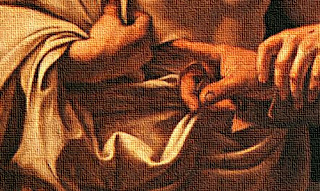SOLEMNITY OF ST. THOMAS, THE APOSTLE
First Reading - Jeremiah 1:4-9
Second Reading - Ephesians 2:19-22
Gospel - John 20:24-29
The first reading reminds about the vocation as premeditated by God with a very specific mission, even before someone comes into existence. The call of Jeremiah sheds light on this fact that everyone comes into being with a mission. Jeremiah recounts that his vocation was to 'be sent out' to proclaim God's word. Jeremiah confesses that he himself is incompetent to do so but God empowers him by touching his mouth; or in other words, Jeremiah is enabled to speak what God wishes. This is to show that the mission of God entrusted to us must be enabled by the grace of God so that it can achieve its purpose. This is what St. Thomas also did, he submitted himself to God when he made the profession of faith which we hear in the gospel, consequently, God empowers him and strengthens his faith.
The second reading celebrates the unity of the Church. The two groups of Christians, sprung from Jews and gentiles, which formerly were so much at loggerheads, are united by the blood of Christ and the single Spirit to form the single New Man which is Christ’s Body, the Church. On the feast day of St Thomas one thinks especially of the unity of the Church in India. The Christians of Goa and Kerala proudly trace their origins back to St. Thomas, who is said to have established Christianity there in the first generation after the Resurrection.
Today’s Gospel passage deals with the profession of faith of Thomas. Thomas, the “doubting” apostle, makes the great profession of faith, “My Lord and my God” (Jn 20:28). Thomas confesses Jesus in the very words (“My Lord and my God”) used by the Psalmist for Yahweh. According to Raymond Brown, Thomas’ profession of Faith is the ultimate Christological proclamation of the fourth gospel. “My Lord (Kyrios) and my God (Theos)” revealed the late first century Church’s realization that Jesus was equal to, and One with, the Eternal Creator of the universe and of all humankind. Here, the most outrageous doubter of the Resurrection of Jesus utters the greatest confession of belief in the Lord Who rose from the dead. This declaration by the “doubting” Thomas in today’s Gospel is very significant for two reasons. 1) It is the foundation of our Christian Faith. Our Faith is based on the Divinity of Jesus as proved by His miracles, especially by the supreme miracle of His Resurrection from the dead. Thomas’ profession of Faith is the strongest evidence we have of the Resurrection of Jesus. 2) Thomas’ Faith culminated in his self-surrender to Jesus, his heroic missionary expedition to India in A.D. 52, his fearless preaching, and the powerful testimony given by his martyrdom in A.D. 72.
Dear friends, let's remind ourselves that we are entrusted with a mission to proclaim the good news but it's not possible to fulfill it by our strength rather by God's empowering grace as we saw in the first reading which was also enacted by St. Thomas through his missionary venture and martyrdom. We do need empowering grace so that we fulfill God's mission by our lives.
In order to receive God's empowering grace, we need faith that culminates in self-surrender to God which finally leads us to the service of our fellow-human beings. Living Faith enables us to see the risen Lord in everyone and gives us the willingness to render each one loving service: “Faith without good works is dead” (Jas 2:17). Mother Teresa presents it this way: “If we pray, we will believe; if we believe, we will love; if we love, we will serve. Only then we put our love of God into action.” It was his Faith in the Lord and obedience to Jesus’ missionary command that prompted St. Thomas to travel to India to preach the Gospel among the Hindus, to establish seven Christian communities (known later as “St. Thomas Christians”), and eventually to endure martyrdom.
We need to grow in the living and dynamic Faith of St. Thomas using the following means prescribed by the Spiritual Fathers: a) We come to know and experience Jesus personally and intimately by the daily and meditative reading of the Bible. b) We strengthen our Faith by the power of the Holy Spirit through personal and community prayer. c) We share in the Divine Life of Jesus by frequenting the Sacrament of the Holy Eucharist. d) We are reconciled with God on a daily basis by repenting of our sins and asking God’s forgiveness and by receiving the Sacrament of Reconciliation whenever we fall into a grave sin.









0 Comments